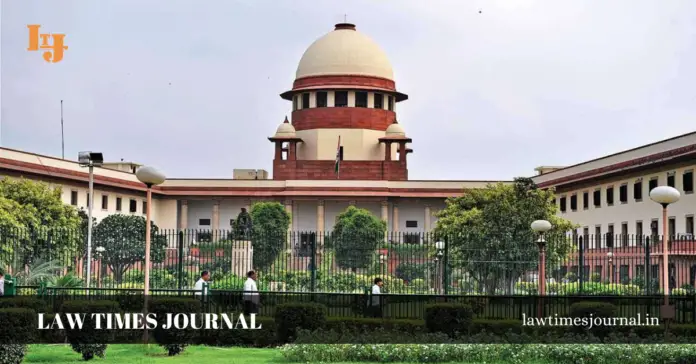
Case No.: Civil Appeal No. 839 of 2020 (Arising out of SLP(C) No. 12449 of 2018)
Case Name: Chowgule and Company Private Limited vs. Goa Foundation & Ors.
Coram: CJI SA Bobde, Justice Surya Kant and B.R. Gavai
Facts of the case
- The Government of India has received information about the rampant exploitation of natural resources in Iron Ore mining sector in the State of Goa, Justice M.B. Shah, a former judge of this Court, is appointed as a Commission of Inquiry under Section 3 of the Commissions of Inquiry Act, 1952. Justice Shah visited Goa and after calling for and receiving information from various authorities as well as mining leaseholders, submitted reports to the Government of India on 15.3.2012 and 25.4.2012.
- The reports were tabled in Parliament along with an Action Taken Report. Consequently, the Government of Goa passed an order restraining/suspending all mining operations in the State with effect. The Ministry of Environment and Forest (MoEF) of the Government of India also kept in abeyance the environmental clearances granted to 139 mines (actually 137 mines – the figure of 139 on account of some duplication) in the State of Goa.
- The writ petition, being in the nature of public interest litigation, prayed, inter alia, for directions to the Union of India and the State of Goa to take steps to terminate the mining leases where mining was carried out in violation of various statutes.
- Various writ petitions came to be filed in the Bombay High Court by several mining leaseholders challenging the reports of Justice Shah and the consequent orders passed by the State of Goa and the Union of India. For a second renewal of the mining lease, it was held, that the State Government must apply its mind and record reasons for renewal being in the interest of mineral development and the necessity to renew the mining lease and the same should also be in conformity with the Constitutional provisions.
- It was also held, that the decision taken by the State of Goa could be examined by way of judicial review. Thereafter, quite independent of the cases pending in this Court, writ petitions were filed by several mining leaseholders in the Bombay High Court praying either for consideration of their applications for a second renewal of the mining lease or the grant of a mining lease on second renewal.
- The High Court heard those writ petitions and by its judgement directed the State of Goa to execute the lease deeds in favour of the leaseholders who had already paid stamp duty pursuant to the orders of the government under the Goa Mineral Policy 2013 and to consider the applications of other leaseholders in accordance with the conditions laid down by this Court in Goa Foundation I (supra). This order of the High Court was made a subject matter of challenge in Goa Foundation vs. Sesa Sterlite Limited and Others (Goa Foundation II).
Conclusions and directions of the Supreme Court
- As a result of the decision, declaration and directions of this Court in Goa Foundation [Goa Foundation v. Union of India, (2014) 6 SCC 590] , the State of Goa was obliged to grant fresh mining leases in accordance with law and not to give second renewals to the mining leaseholders.
- The State of Goa was not under any constitutional obligation to grant fresh mining leases through the process of competitive bidding or auction.
- The second renewal of the mining leases granted by the State of Goa was unduly hasty, without taking all relevant material into consideration and ignoring available relevant material and therefore not in the interests of mineral development. The decision was taken only to augment the revenues of the State which is outside the purview of Section 8(3) of the MMDR Act. The second renewal of the mining leases granted by the State of Goa is liable to be set aside and is quashed.
- The mining leaseholders who have been granted the second renewal in violation of the decision and directions of this Court in Goa Foundation [Goa Foundation v. Union of India, (2014) 6 SCC 590] are given time to manage their affairs and may continue their mining operations till 1532018. However, they are directed to stop all mining operations with effect from 1632018 until fresh mining leases (not fresh renewals or other renewals) are granted and fresh environmental clearances are granted.
- The State of Goa will take all necessary steps to expedite recovery of the amounts said to be due from the mining leaseholders according to the show-cause notices issued to them and under other reports available with the State of Goa including the report of Special Investigating Team and the Team of Chartered Accountants.”
Order of the court
It will not be out of place to mention here the specific stand of the State Government before the High Court that the State is monitoring to ensure that only such of the mineral is permitted to be transported which is mined prior to 15.3.2018. Needless to state, that the transportation of the mineral would be only in respect of such minerals on which royalty is paid. The appellants/mining leaseholders would be permitted to transport the royalty paid ore/mineral from the jetties/stockyard or pitheads based on the valid transit permits issued to them by the competent authority of the State Government. All pending applications including the application for intervention shall stand disposed of.
Edited by Vartika Gajendra Singh
Approved & Published – Sakshi Raje








